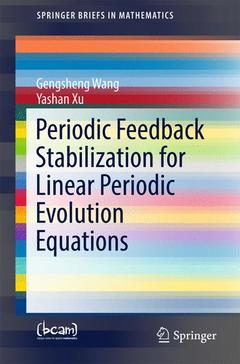Description
Periodic Feedback Stabilization for Linear Periodic Evolution Equations, 1st ed. 2016
SpringerBriefs in Mathematics Series
Authors: Wang Gengsheng, Xu Yashan
Language: English
Approximative price 58.01 €
In Print (Delivery period: 15 days).
Add to cartSupport: Print on demand
Description
/li>Contents
/li>Biography
/li>Comment
/li>
This book introduces a number of recent advances regarding periodic feedback stabilization for linear and time periodic evolution equations. First, it presents selected connections between linear quadratic optimal control theory and feedback stabilization theory for linear periodic evolution equations. Secondly, it identifies several criteria for the periodic feedback stabilization from the perspective of geometry, algebra and analyses respectively. Next, it describes several ways to design periodic feedback laws. Lastly, the book introduces readers to key methods for designing the control machines. Given its coverage and scope, it offers a helpful guide for graduate students and researchers in the areas of control theory and applied mathematics.
Prof. Gengsheng Wang received his Ph.D. in Mathematics from Ohio University (Athens, USA) in 1994. He is currently Luojia Professor at the School of Mathematics and Statistics, and Director of the Institute of Mathematics, at Wuhan University, China. His research work mainly focus on optimal control problems, (in particular, time optimal control problems), controllability and stabilization for ordinary differential equations, and partial differential equations of parabolic type.
Dr. Yashan Xu received his Ph.D. in Mathematics from Fudan University (Shanghai, China) in 2006. He is currently an Associate Professor at the School of Mathematical Sciences, Fudan University, China. His research interests include differential games, optimal control theory and stabilization for evolution equations.
Presents a focused and self-contained survey on the topic
Offers an easy to read, step by step introduction
Contains significant examples and applications
Includes supplementary material: sn.pub/extras




